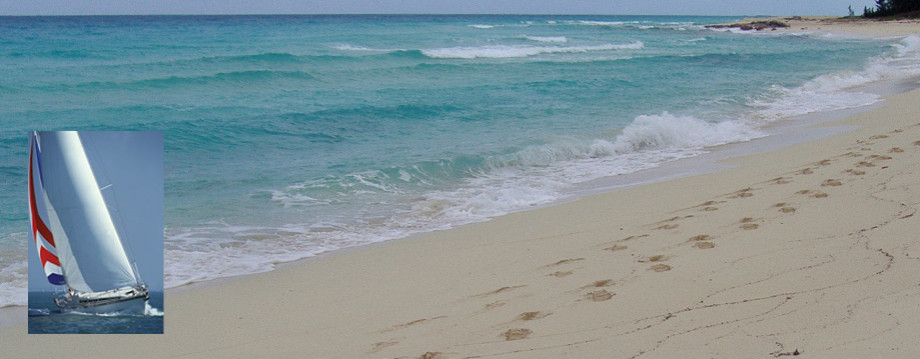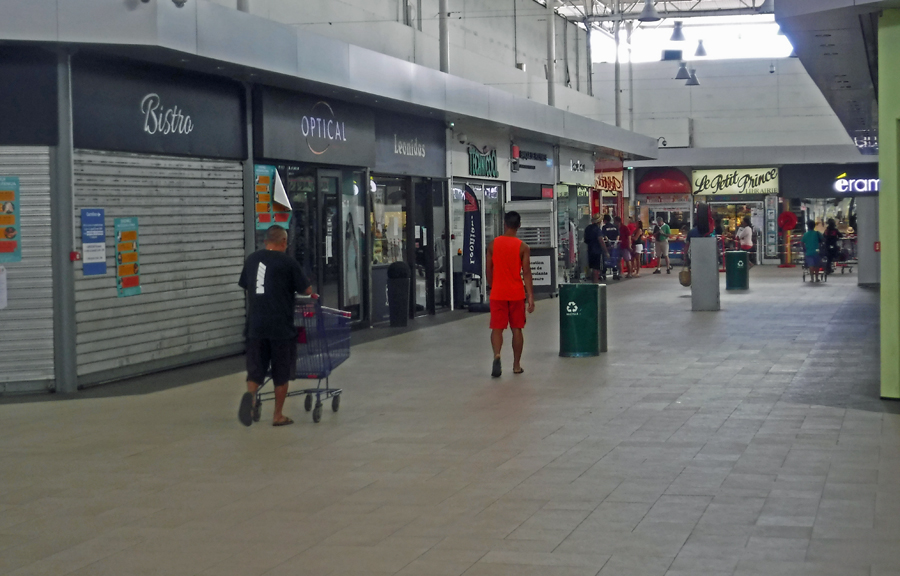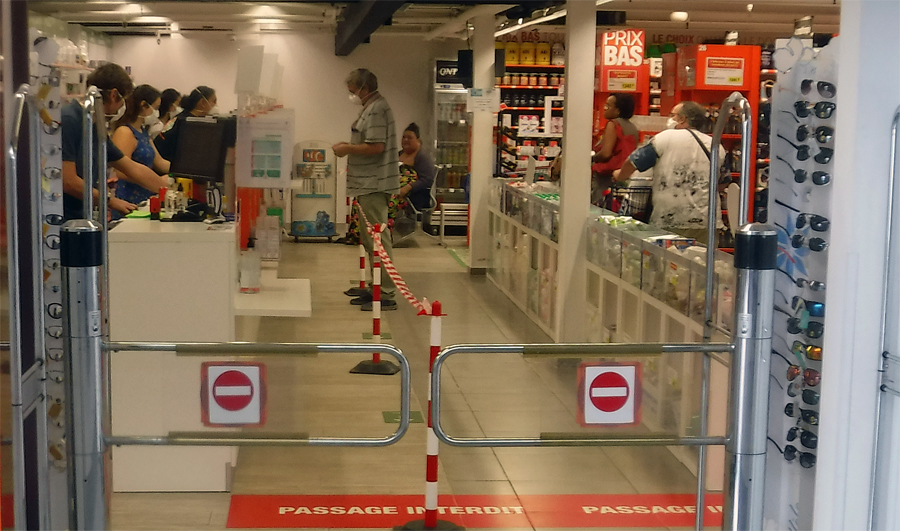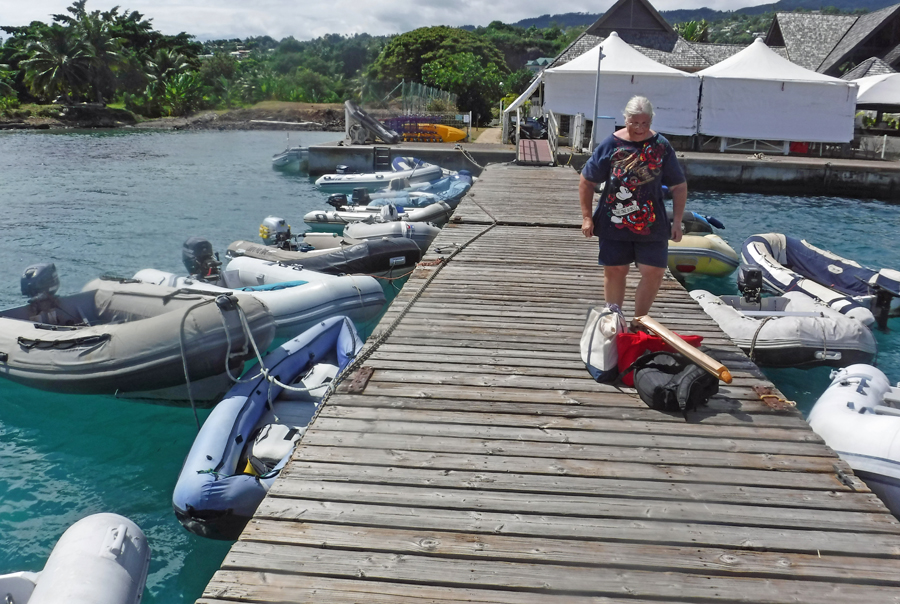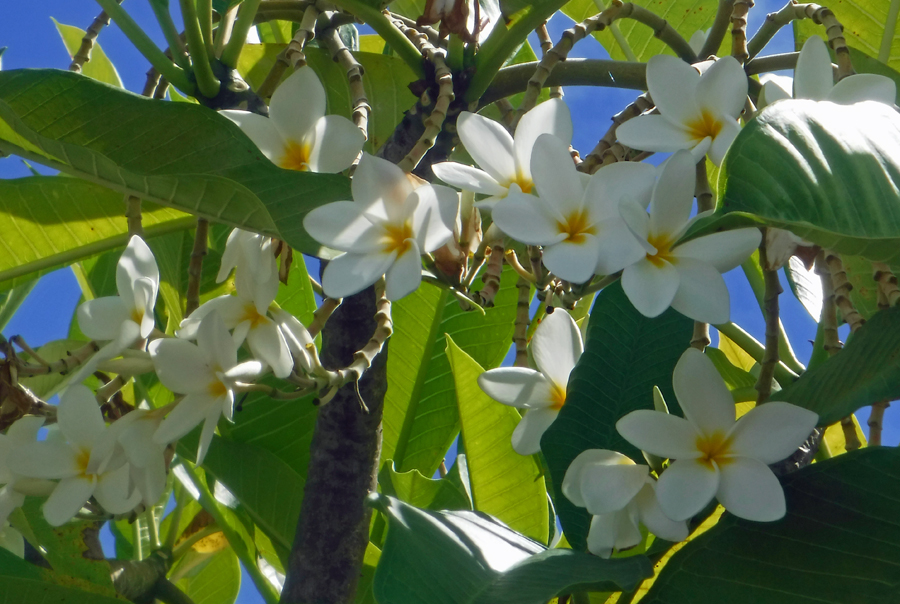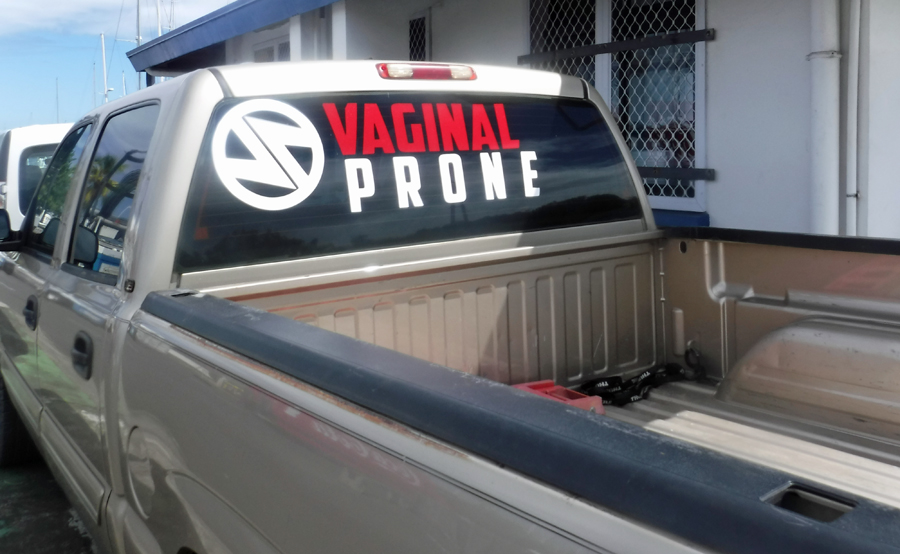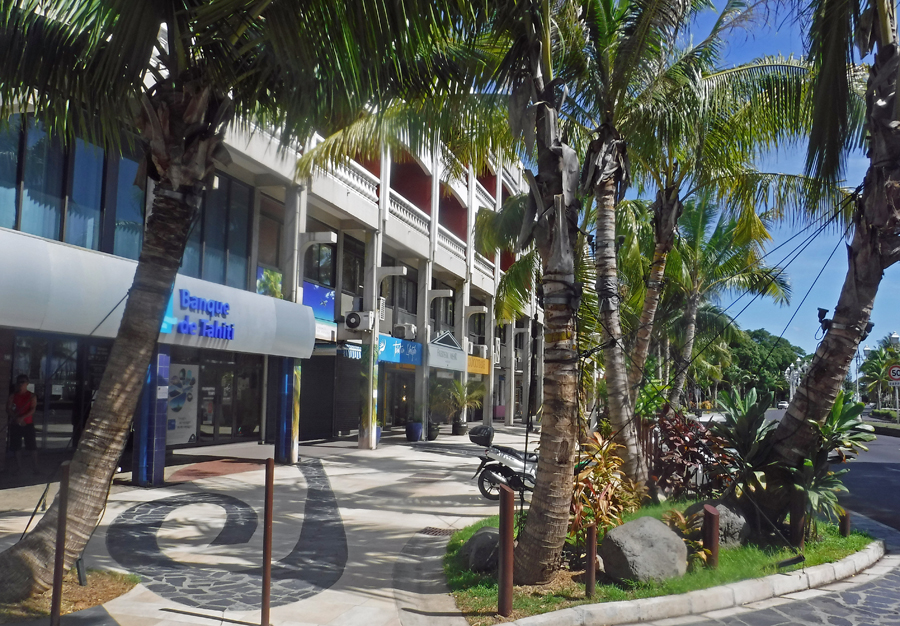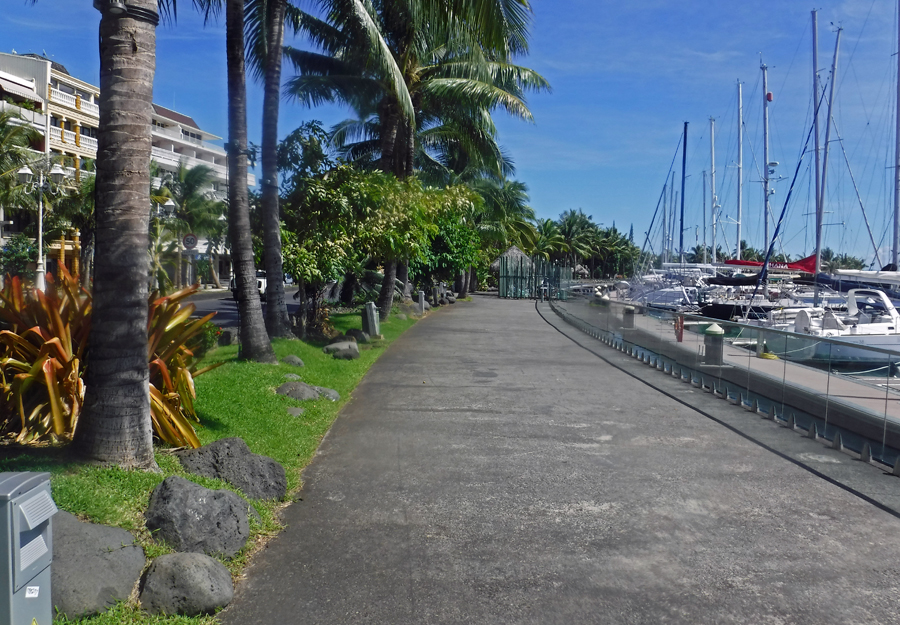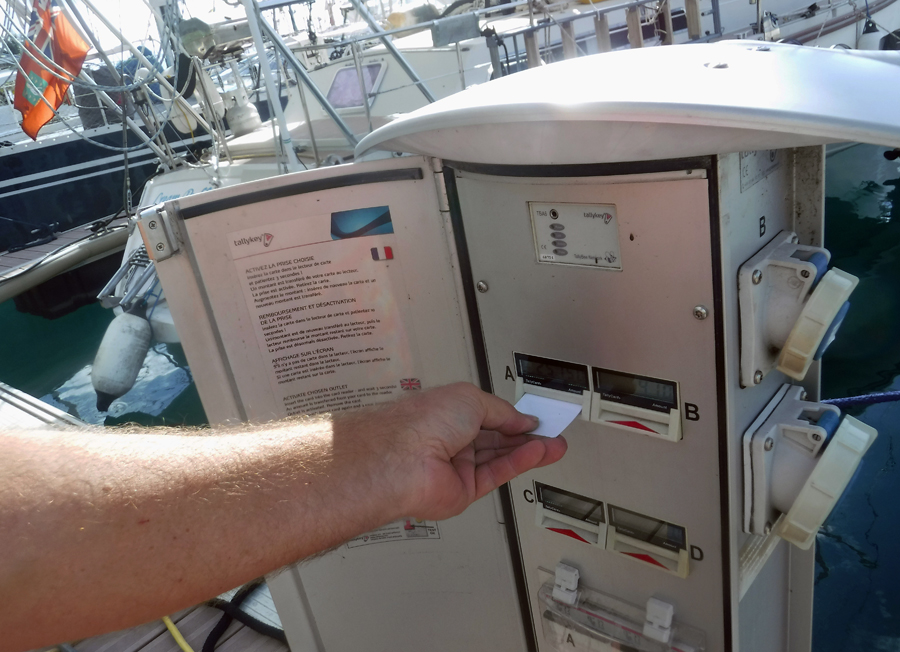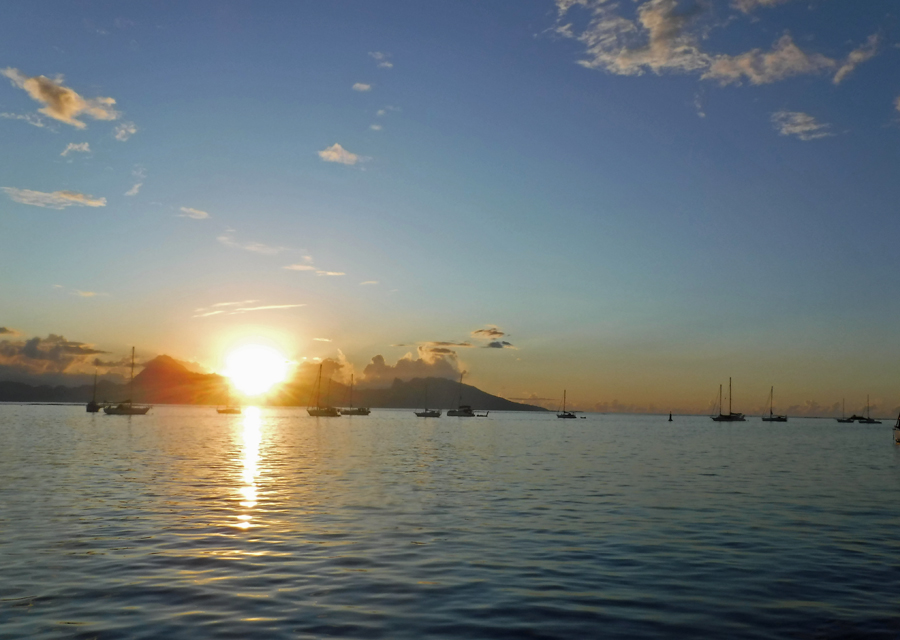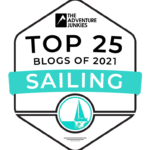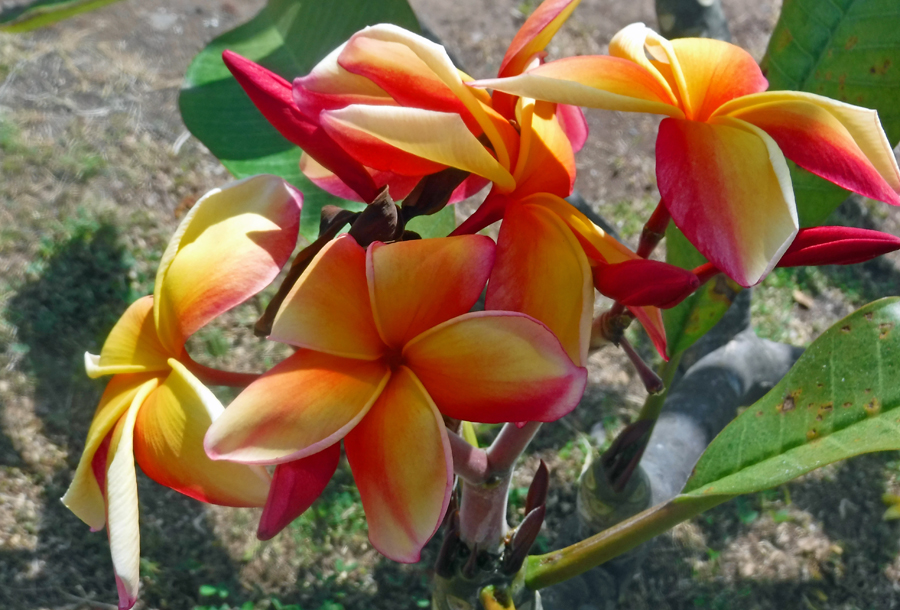
The flowers on these trees smell amazing. Polynesian women wear them in their hair and make leis from them
Our first two weeks in Tahiti were spent in a nice little cove near Marina Taina on the northwest side of the island. From day one, it has been very educational. The morning following our arrival we got our dinghy ready for the short trip to the marina dinghy dock for our check-in with customs and immigration. The outboard motor fired right up and then after a couple of minutes it died. The motor has been stored in our aft lazarette during the entire time we were in Panama. I gave myself extra time just in case the engine turned out to be problematic. It hasn’t been run for quite some time since our six-month stay on the Pacific side of Panama was in a marina. The clock was ticking on our 8 AM appointment with customs and immigration. The pressure is on. I had about an hour to resolve the engine issue before we’d be late. Quite quickly, I discovered the bulb in the fuel line was bad. I replaced it. Then I found the fuel line inside of the fuel tank had come loose. I fixed that. The engine started and died after a few minutes. At this point, I am thinking our fuel has gone bad and unfortunately this is going to take some time. The carburetor is going to need cleaning. I don’t have enough time for this.
We row over to the neighboring boat and ask for a lift explaining we need to meet the government officials to check-in. Greeting us is a really nice British couple, Cain and April. April says, let her fill out the paperwork and she’ll take us there. Paperwork? On the ride to the dinghy dock, she explains what is needed to move about Tahiti due to the regulations put in place because of the virus. This is all new news to us. She is kind enough to show us the area explaining where to drop off trash, get water, fuel, and how to get to the grocery store. The paperwork she needed is a form we have to carry with us whenever we are outside. All people on Tahiti are restricted in movement. On the form, we state where we are going, where we are coming from and the purpose of the trip. If we are stopped by the police we need to produce the form so they can see we are out on an approved errand and haven’t deviated. It is a pretty easy process.
After we are checked-in, our agent gives us some blank forms and explains the process. We fill out one on the spot so we can go to the grocery store. After 29 days at sea, as you can imagine, we are a little low on fresh food. It is a short walk to Carrefour. We love Carrefour stores. They have great selections at good prices. In the Caribbean Islands, we looked forward to visiting the French islands because we knew we could stock up at these awesome stores. We discovered Carrefour stores on a trip to France many years ago. Some are massive. Now here on Tahiti, we are not disappointed. We have two errands on the list: Food and the internet.
We divide and conquer. I wait in line at the VodaFone store for a SIM card. Cindy hits Carrefour. We continue to learn some of the restrictions. The grocery store only allows one family member in at a time. Upon entry, sanitizer is sprayed on customer’s hands (they are about to touch food items) and the handles of the grocery cart are wiped down with disinfectant by two employees at the entrance. Inside the store, the selection is fantastic. They even have toilet paper. Not only do they have it, but it is also on an end aisle display and on sale. Many American readers will be green with envy after reading this last sentence.
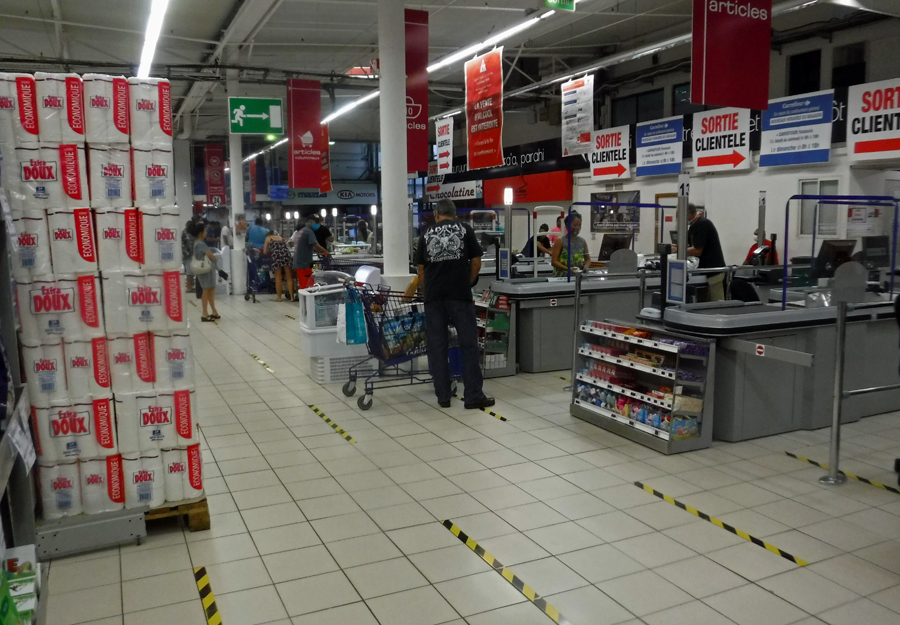
Inside Carrefour – Look at all that toilet paper! Plastic screens protect the cashiers and tape on the floor marks 1 meter to stand apart

The phone store allows access to a limited number. Boxes mark where to stand in line (in the middle of the mall in everyone else’s way)
The government of French Polynesia made it loud and clear to the residents here, there will be no shortages of food and necessary items. Hearing this, the islanders have not stockpiled or hoarded items like residents in other countries. The only item we found rationed is eggs. They are limited to one pack (6, 12, or 20) per person. Cindy managed to get everything on the list including eggs. If my memory serves correctly, eggs are used in vaccine development. Perhaps this is why they are limited. Or perhaps it is just a Tahiti thing, not sure.
Cindy and I actually like “social distancing” (a new phrase we learned this week). We talked about how people in the U.S. would stand too close. Neither one of us likes this. People who live in larger cities tend to do this. I also hate it when we are in a line somewhere and the person behind is impatient. They think if they stand closer, so close I can feel their breath on the nape of my neck or if they bump my butt with their shopping cart, it makes the line move faster. Guess what, it doesn’t. Instead, it provokes a rather offensive comment from me delivered in such a way their eyes suddenly get big and they back off.
For as much success Cindy had with groceries, I failed with the SIM card. I got one, no problem. But the signal in the anchorage is weak. The data was so slow it was reminiscent of the days of our first computer, a Macintosh SE with a 20 meg hard-drive, 4 megs of RAM, and dial-up modem. A flash-back to the days before the internet. Believe it or not, I paid about $3,000 for that thing. That was a ton of money back then. But, the investment paid off since the computer got me a big promotion at work. They thought I walked on water because I could make pie charts. I became the company’s computer guru. All I really did was try to stay one chapter ahead on the learning curve. I digressed. Sorry.
Cindy, using our now very slow internet, manages to locate another option for us. It is a service called Tahiti Wi-Fi. Don’t you just love it when the name of the business tells you exactly what it is they do? Tahiti Wi-Fi has little routers working off multiple cellular networks. The store is at the airport. Their concept is simple: as tourists get off the plane they can pick up a router and prepay for data. They use the router as a portable hotspot for their Smartphone saving their expensive roaming charges. There are no fees for the router rental; we just pay for the data usage which isn’t too expensive. We can keep it for as long as we like and there are no contracts or minimums. On their web site, they had a coverage speed map. On our super slow Vodafone SIM, this took forever to load. After very patiently watching the infernal loading circle spin, it appeared to us on the Tahiti Wi-Fi map we are in their 4G area. Cindy contacts them via email.
Jerome is the owner and as you can imagine with no tourist his business is as slow as the Vodafone internet. The airport is closed and no tourists are allowed to enter French Polynesia. He was very quick to respond to Cindy’s questions and agreed to meet me at the marina since the store was inaccessible. And besides, he lives in the same area as the marina. I hop into our now running very smoothly dinghy and head over to the dinghy dock. The meeting was kind of funny if you can look through the ugliness of the virus impact. Here are two masked men meeting at a closed restaurant on the shady darker side (to escape the sun).
“Hey man! You Jerome?”
“Yeah”
“You got the stuff?”
“Yeah. You got the money?”
I swear, this was like a drug deal. Jerome turned out to be a really nice guy. We chatted for a bit and this is when I found out he was the owner. His business has really suffered. I told him I would help promote his company to the other boats on anchor. I returned to our boat and tested out our new connection. Bingo! It rocks! Putting the company info on the local FaceBook group page with a recommendation has helped Jerome pick up a few boats in the area. It’s probably not near the volume he is used to but, as he said, every little bit helps.
For about 2 weeks, we stayed in this same area. Our only exposure to Tahiti is the walk from the dinghy dock to Carrefour. Our final paperwork arrived from our agent. It included a certificate to purchase duty-free fuel for Cream Puff though our stay in French Polynesia. The new Covid-19 cases on the island have basically stopped. It is much easier to contain a virus such as this on an island. Closing ports and airports pretty much do it. Adding the movement restrictions and closing non-essential businesses is the icing on the cake. In daylight hours, we are allowed out whenever we want so long as we have the form with us and are running an authorized errand.
We expect the restricted movement to be lifted and businesses to begin opening. Most Tahitians are talking about this being the case. We were also in need of fuel. Having to motor into Tahiti on our last two days because of the lack of wind, our diesel tank is about ¼ full. We are running our generator on anchor periodically and thought it would be best to top off. We both decide if we are going to pull up the anchor and move let’s move to the marina in downtown Pape’ete, the capital city of French Polynesia. As businesses open, it would be nice to be in the hub of things. We enjoy being downtown as much as we do isolated beaches and coves.
Pape’ete Marina is unique. They do not take reservations. They seldom answer email. The rates are pretty much anyone’s guess. Cindy called to see if they have space. She finds Franco who speaks English. In his words, he speaks English because he has to deal with boaters. We are not allowed to move the boat willy-nilly without first contacting the port authority (part of the restrictions). Franco informs us he does have some space. He gives us the price and off we go. First to the fuel dock and then to the north side of the island and Marina Pape’ete. The Port Captain has to us grant permission to move. We also contact him again for clearance to pass the airport runway (both ends). We do this on the windiest day ever. It is blowing 25 knots with gusts to 35 as we pass the airport.
There is nothing I enjoy more than docking Cream Puff in a new slip with crosswinds of 25 knots in-between other expensive boats (sarcasm). We picked our slip. Most times going into a marina we are assigned a slip. This marina allows us to tie in any open slip. I’m not used to having such choices. We picked a good one. As with most marinas, several other boaters came to assist with lines. We made a pretty good landing. We settled in and called Franco to let him know we’d arrived.
The marina office is under construction. Because of this, the temporary office is located in a space in the ferry terminal about a twenty-minute walk away. A special key-card is required to enter and exit the marina. Franco says he is on his way with the key-card since we can’t get out to walk to him. A really happy guy shows up on a bicycle a few minutes later. It is Franco. He tells us to take our time to come to the office for the paperwork. The office closes at 3 PM due to the restricted hours complying with the Covid-19 policies. He agrees we picked a good slip.
I am going to digress for a second here. Sorry. One of the things I enjoy at a marina is metered electricity and water. We pay for only what we use. Too many marinas in the U.S. during our travels thought it was okay to charge a fixed daily rate based on whether we plug into a 30 amp or 50 amp socket. We have to use the 50 amp socket because our boat is 220-240v. We very rarely pull more than 20 amps even with air-conditioning running. But, because we plug into 50 amp, we are charged a higher price. Often times the daily rates quoted to us was $30, or more. This might not seem like much as a standalone number but, this equates to almost $1,000 per month for electricity. Our large house in Atlanta, during the hot Georgia summer, running three large air-conditioning units 7 days a week for 24 hours per day (I worked from home) generated a bill in the area of $400 per month, at most. Marina’s are ripping-off transient boaters. The rates at this marina in Tahiti are 73¢ per kWh. This is considered very high. It is the second-highest we have paid (Grenada was highest at 77¢). We know running air-conditioning at this rate Cream Puff’s monthly electric bill will be in the $350 range. What would you rather do: Pay for what you use or just hand over $1,000? Rant over. Sorry.
Cindy and I walk down to the ferry terminal in search of Franco and his temporary office. This is just past the cruise ship docks. For the first time, we get a glimpse of downtown. The streets are empty of pedestrians. We arrive at the ferry terminal. It is closed because of the ban on inter-island travel. One of the first regulations passed was this ban. Many of the outlying islands have limited medical facilities. They may have a clinic. But, they certainly can not handle a viral outbreak. This ban was quickly put into place to protect these islanders. It has worked! The only cases of the Covid-19 are here on Tahiti. Roaming about the empty terminal, we are stopped by a security guard.
In my very terrible French, I ask the location of the marina office. She tries to explain and then realizes it is a lost cause. Saying, follow me, she realizes, is going to yield a faster result than continuing to tell me in French as I gaze at her bewilderingly. We once again find Franco. He greets us with a smile and says, “Welcome to my country where it is all ocean. You have the right form of transport to see it.” I like this guy.
We are pleasantly surprised the marina has offered reduced rates because of the restrictions and the fact some boaters are just plain stuck. They basically extended their off-season rate. This is an incredibly nice gesture of the owner of this facility.
Franco creates a keycard for us to use electricity and water. We pay to have credit on the card so now we can insert the card into our pedestal by the boat to get utilities. When the money runs out we insert the card again to add more. When the card runs out, we visit Franco to refill it.
Back on the boat we are so looking forward to some air-conditioning. It is darn hot and humid here. The last thing I need to do for nice cold air-conditioning is change the plug on Cream Puff shore-power cord to the European version. Panama used the USA twist 50 amp plug. Amazingly, to remove the USA plug, I need three different screwdrivers. The euro-style plug needs one screwdriver and then it twists together. I get this all done. I am hot. I want AC. I put my newly charged utility card into the slot on the pedestal: Error_2. Hmm. I wonder what this means. There are only four different ways to insert a key-card. I try all of them. Error_2.
It’s getting close to 3 PM now and we do not want Franco to leave before we have electricity. Cindy calls him. He explains there might be some free electricity on the meter perhaps left there by the previous boater. Try it without the card, he says. I do. Error_2.
Franco comes over on his bicycle. He has a magic card that works in all the meters. This is bound to do the trick: Error_2. And then, he says those fatal words, “It’s broken. I need to call the electrician. You’ll have to move the boat to another slip if you want electricity”. Not what we wanted to hear. I mean, we are both so ready for a cold beer, air conditioning, and a hot shower. “But Franco, you agreed this was a good slip”. We both shrug. He is nice enough to try out his special magic card on an open slip two spots away. It works. This is where we decide to move.
People see us starting to untie, “Are you leaving already?” I explain about the broken meter. And then, we have four people who amazingly appear out of nowhere to help us with the lines. Two of them have beers in hand. And of course, the wind hasn’t died down. Why would Murphy want to give us a break? We exit and make a better landing than the first time. People have to be very impressed by now with Cindy and myself and our ability to handle a 53’ boat in an enclosed space, with a dinghy tied to the bow and gusting crosswinds as we reverse into our new spot.
Many Restrictions are Lifted
Our gamble to grab a spot in town has paid off. It was announced Tahiti is lifting many of the restrictions. In the past two weeks, there have been only 3 new cases of the virus. These were somewhat expected since the persons knew they were exposed and were already quarantined.
Today we walked to the local Champion Grocery store to pick up a few things. On the way, we stopped into the Marina office. Franco is starting to teach us Tahitian words. We can now say: hello, goodbye, thank you, and thank you very much. No need anymore to fill out forms. We saw other people walking on the streets and witnessed businesses opening for the first time in 5 weeks. It is like the sun came out. Hooray! Let us dust of the cameras and in the next post, we’ll show you Pape’ete. We are off now for a nice long walk. Freedom! More to come soon…
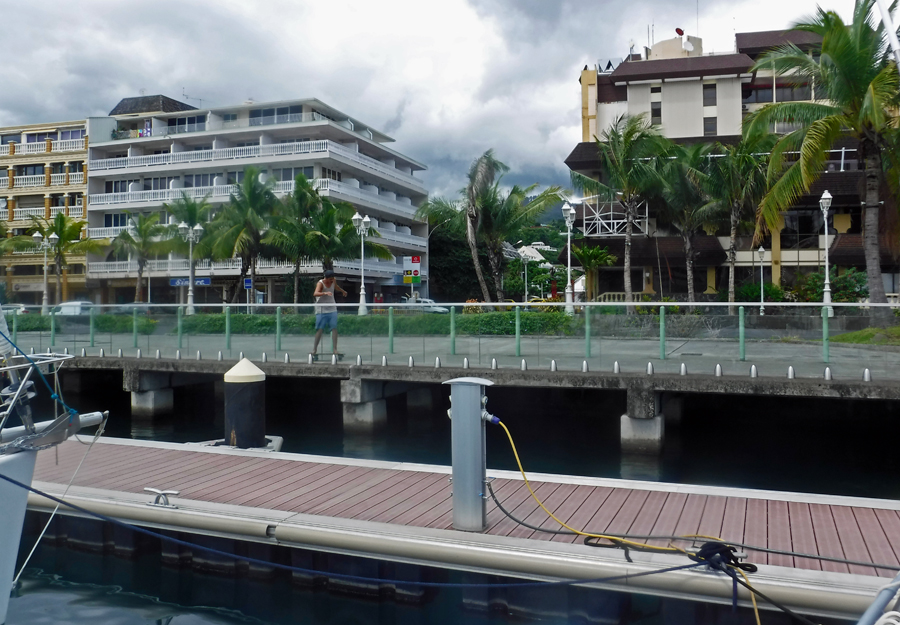
Our new view from the marina – from the cockpit we are entertained by the passers-by. Not as pretty but a lot more fun!
